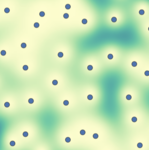|
|
|
|
Description of the workshop Fermion point processes were introduced by Odile Macchi in 1975 to model the spatial distribution of fermions in optical beams. Since then, these point processes have lived a life of their own in physics, probability, statistics, machine learning, and signal processing, often being renamed "determinantal point processes" when the connection to physical particles became more anecdotal. This interdisciplinary workshop will gather experts across physics, mathematics, and signal processing, in order to reconnect, discuss the links between fermions and DPPs in 2019, and determine how much light the two objects can still shed on each other. In particular, we will try to answer the following questions (feel free to suggest some) :
Registration is free, but mandatory. Where and when Here is a google map with all relevant places. The workshop will be held at Laboratoires Painlevé and CRIStAL, on the campus of Univ. Lille. Talks and coffee breaks are in building M2, 1st floor. Lunches are in building M3 (Salle des conseils or Salle Delattre). See also the full schedule here. From train station Lille Flandres, take the subway line 1 (the yellow one on maps), direction "4 cantons", and stop at "Cité scientifique". Then it's a 5min walk. From the airport, either take a cab or the shuttle to the train station (20min). From train station Lille Europe, walk to train station Lille Flandres (10min), then take the subway as described above. From Lille-Lesquin airport, there is a shuttle that takes you to train station Lille Flandres (20min), then take the subway as described above. A cab from the airport to the campus is also a good option (it's around 5km). Guest speakers Odile Macchi, Académie des Sciences, France. Slides Hans Zessin, Univ. Bielefeld, Germany Luis Daniel Abreu, Acoustics research institute Vienna, Austria Douglas Lundholm, Dept. of mathematics, KTH Stockholm, Sweden. Slides Grégory Schehr, CNRS & Lab. de physique et modèles statistiques, Univ. Paris-Saclay, France. Slides Pascal Degiovanni, CNRS & Lab. de physique, ENS Lyon, France. Slides Chris Westbrook, CNRS & Lab. Fabry, Institut d'Optique, Paris, France. Slides Jérémie Bouttier, Institut de physique théorique, CEA Saclay, France & Lab. de physique, ENS Lyon, France. Slides Titles and abstracts can be downloaded here. Schedule Please see the online schedule. Beware that some last minute changes have been done. Background material and output One of the challenges of interdisciplinary meetings is to determine a common vocabulary. Here is a document that introduces DPPs, fixes notation, and gives suggestions of topics to discuss at the workshop. Depending on the outcome of the workshop, the document could also be a basis for a note that we collectively write to report our discussions. Food and drinks We cover coffee breaks and two lunches (Thursday and Friday) for all attendees. On Wednesday evening, we will lead whoever feels like it to drinks and food in town, but we won't cover the fees of nonspeakers. On Thursday evening, there will be a more formal workshop dinner for all the participants at the restaurant Le Compostelle; please register by Monday 4 of february if you want to participate via this Doodle. Organizers
Acknowledgments This workshop is funded by ANR programme BoB. |


